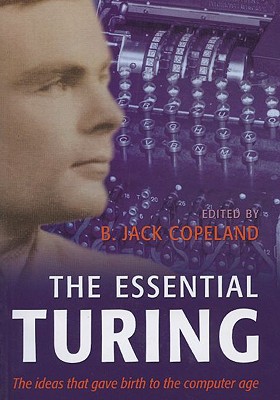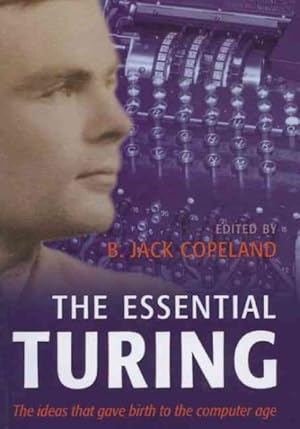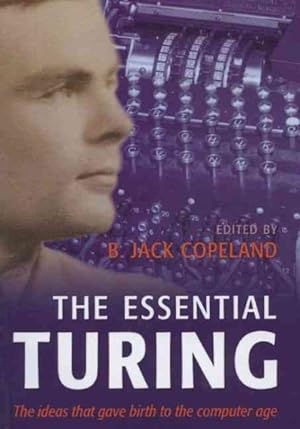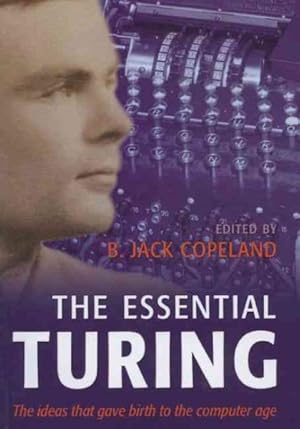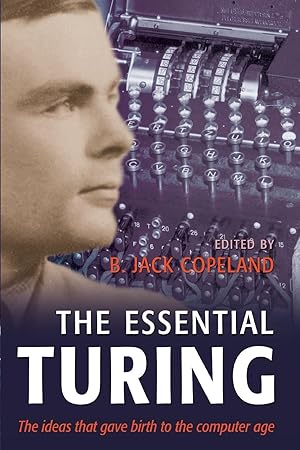essential turing (32 risultati)
Filtri di ricerca
Tipo di articolo
- Tutti i tipi di prodotto
- Libri (32)
- Riviste e Giornali (Nessun altro risultato corrispondente a questo perfezionamento)
- Fumetti (Nessun altro risultato corrispondente a questo perfezionamento)
- Spartiti (Nessun altro risultato corrispondente a questo perfezionamento)
- Arte, Stampe e Poster (Nessun altro risultato corrispondente a questo perfezionamento)
- Fotografie (Nessun altro risultato corrispondente a questo perfezionamento)
- Mappe (Nessun altro risultato corrispondente a questo perfezionamento)
- Manoscritti e Collezionismo cartaceo (Nessun altro risultato corrispondente a questo perfezionamento)
Condizioni Maggiori informazioni
Legatura
Ulteriori caratteristiche
- Prima ed. (1)
- Copia autograf. (Nessun altro risultato corrispondente a questo perfezionamento)
- Sovracoperta (Nessun altro risultato corrispondente a questo perfezionamento)
- Con foto (11)
- Non Print on Demand (24)
Lingua (2)
Spedizione gratuita
Paese del venditore
Valutazione venditore
-
Condizione: acceptable. Fairly worn, but readable and intact. If applicable: Dust jacket, disc or access code may not be included.
-
The Essential Turing: Seminal Writings in Computing, Logic, Philosophy, Artificial Intelligence, and Artificial Life plus The Secrets of Enigma
Lingua: Inglese
Editore: Oxford University Press, USA, 2004
ISBN 10: 0198250800 ISBN 13: 9780198250807
Da: Books From California, Simi Valley, CA, U.S.A.
Paperback. Condizione: Fine.
-
The Essential Turing: Seminal Writings in Computing, Logic, Philosophy, Artificial Intelligence, and Artificial Life plus The Secrets of Enigma
Lingua: Inglese
Editore: Clarendon Press, New York, NY, 2004
ISBN 10: 0198250800 ISBN 13: 9780198250807
Da: Conover Books, Martinsville, VA, U.S.A.
Prima edizione
Soft cover. Condizione: Good. 1st Edition. Minor edge and corner wear; lightly scuffed and scratched; spine is gently creased; some light shelf wear; ex-library with the usual library markings; overall a nice used copy! Full-color illustrated wrapper with red and white lettering. 613 historical and informative pages nicely enhanced by black and white photographs and illustrations! "Alan Turing was one of the most influential thinkers of the 20th century. In 1935, aged 22, he developed the mathematical theory upon which all subsequent stored-program digital computers are modeled. At the outbreak of hostilities with Germany in September 1939, he joined the Goverment Codebreaking team at Bletchley Park, Buckinghamshire and played a crucial role in deciphering Enigma, the code used by the German armed forces to protect their radio communications. Turing's work on the version of Enigma used by the German navy was vital to the battle for supremacy in the North Atlantic. He also contributed to the attack on the cyphers known as 'Fish' which were used by the German High Command for the encryption of signals during the latter part of the war. His contribution helped to shorten the war in Europe by an estimated two years. After the war, his theoretical work led to the development of Britain's first computers at the National Physical Laboratory and the Royal Society Computing Machine Laboratory at Manchester University. Turing was also a founding father of modern cognitive science, theorizing that the cortex at birth is an 'unorganized machine' which through 'training' becomes organized 'into a universal machine or something like it' He went on to develop the use of computers to model biological growth, launching the discipline now referred to as Artificial Life. The papers in this book are the key works for understanding Turing's phenomenal contribution across all these fields. The collection includes Turing's declassified wartime 'Treatise on the Enigma'; letters from Turing to Churchill and to codebreakers; lectures, papers, and broadcasts which opened up the concept of AI and its implications; and the paper which formed the genesis of the investigation of Artificial Life.".
-
The Essential Turing; Seminal Writings in Computing, Logic, Philosophy, Artificial Intelligence, and Artificial Life plus The Secrets of Enigma
Da: Midway Book Store (ABAA), St. Paul, MN, U.S.A.
Paperback. Condizione: Very Good. 23.5 x 15.5 cm. 613pp. Paperback copy. Light edgewear.
-
The Essential Turing: Seminal Writings in Computing, Logic, Philosophy, Artificial Intelligence, and Artificial Life Plus the Secrets of Eni (Paperback or Softback)
Lingua: Inglese
Editore: Oxford University Press (UK) 6/24/2013, 2013
ISBN 10: 0198250800 ISBN 13: 9780198250807
Da: BargainBookStores, Grand Rapids, MI, U.S.A.
Paperback or Softback. Condizione: New. The Essential Turing: Seminal Writings in Computing, Logic, Philosophy, Artificial Intelligence, and Artificial Life Plus the Secrets of Eni. Book.
-
Condizione: New.
-
Condizione: As New. Unread book in perfect condition.
-
Hardcover. Condizione: Fair. Lots of wear, scuffs on edges, inside good, totally readable. may require signature at delivery B.
-
The Essential Turing (Paperback)
Lingua: Inglese
Editore: Oxford University Press, Oxford, 2004
ISBN 10: 0198250800 ISBN 13: 9780198250807
Da: Grand Eagle Retail, Bensenville, IL, U.S.A.
Paperback. Condizione: new. Paperback. Alan Turing, pioneer of computing and WWII codebreaker, is one of the most important and influential thinkers of the twentieth century. In this volume for the first time his key writings are made available to a broad, non-specialist readership. They make fascinating reading both in their own right and for their historic significance: contemporary computational theory, cognitive science, artificial intelligence, and artificial life all spring from thisground-breaking work, which is also rich in philosophical and logical insight. An introduction by leading Turing expert Jack Copeland provides the background and guides the reader through the selection.About Alan Turing Alan Turing FRS OBE, (1912-1954) studied mathematics at King's College, Cambridge. He was elected a Fellow of King's in March 1935, at the age of only 22. In the same year he invented the abstract computing machines - now known simply as Turing machines - on which all subsequent stored-program digital computers are modelled. During 1936-1938 Turing continued his studies, now at Princeton University. He completed aPhD in mathematical logic, analysing the notion of 'intuition' in mathematics and introducing the idea of oracular computation, now fundamental in mathematical recursion theory. An 'oracle' is an abstract device ableto solve mathematical problems too difficult for the universal Turing machine. In the summer of 1938 Turing returned to his Fellowship at King's. When WWII started in 1939 he joined the wartime headquarters of the Government Code and Cypher School (GC&CS) at Bletchley Park, Buckinghamshire. Building on earlier work by Polish cryptanalysts, Turing contributed crucially to the design of electro-mechanical machines ('bombes') used to decipher Enigma, the code by means of whichthe German armed forces sought to protect their radio communications. Turing's work on the version of Enigma used by the German navy was vital to the battle for supremacy in the North Atlantic. He alsocontributed to the attack on the cyphers known as 'Fish'. Based on binary teleprinter code, Fish was used during the latter part of the war in preference to morse-based Enigma for the encryption of high-level signals, for example messages from Hitler and other members of the German High Command. It is estimated that the work of GC&CS shortened the war in Europe by at least two years. Turing received the Order of the British Empire for the part he played. In 1945, the warover, Turing was recruited to the National Physical Laboratory (NPL) in London, his brief to design and develop an electronic computer - a concrete form of the universal Turing machine. Turing's report setting outhis design for the Automatic Computing Engine (ACE) was the first relatively complete specification of an electronic stored-program general-purpose digital computer. Delays beyond Turing's control resulted in NPL's losing the race to build the world's first working electronic stored-program digital computer - an honour that went to the Royal Society Computing Machine Laboratory at Manchester University, in June 1948. Discouraged by the delays at NPL, Turing took up the Deputy Directorship ofthe Royal Society Computing Machine Laboratory in that year. Turing was a founding father of modern cognitive science and a leading early exponent of the hypothesis that the human brain is inlarge part a digital computing machine, theorising that the cortex at birth is an 'unorganised machine' which through 'training' becomes organised 'into a universal machine or something like it'. He also pioneered Artificial Intelligence. Turing spent the rest of his short career at Manchester University, being appointed to a specially created Readership in the Theory of Computing in May 1953. He was elected a Fellow of the Royal Society of London in March 1951 (a high honour). The ideas that gave birth to the computer a Shipping may be from multiple locations in the US or from the UK, depending on stock availability.
-
The Essential Turing: Seminal Writings in Computing, Logic, Philosophy, Artificial Intelligence, and Artificial Life Plus the Secrets of Eni
Lingua: Inglese
Editore: Oxford University Press(UK) 2013-06, 2013
ISBN 10: 0198250800 ISBN 13: 9780198250807
Da: Chiron Media, Wallingford, Regno Unito
EUR 36,72
EUR 17,64 shipping
Spedito da Regno Unito a U.S.A.Quantità: 10 disponibili
Aggiungi al carrelloPF. Condizione: New.
-
The Essential Turing
Lingua: Inglese
Editore: Oxford University Press, GB, 2004
ISBN 10: 0198250800 ISBN 13: 9780198250807
Da: Rarewaves.com USA, London, LONDO, Regno Unito
EUR 54,37
Spedizione gratuita
Spedito da Regno Unito a U.S.A.Quantità: Più di 20 disponibili
Aggiungi al carrelloPaperback. Condizione: New. Alan Turing, pioneer of computing and WWII codebreaker, is one of the most important and influential thinkers of the twentieth century. In this volume for the first time his key writings are made available to a broad, non-specialist readership. They make fascinating reading both in their own right and for their historic significance: contemporary computational theory, cognitive science, artificial intelligence, and artificial life all spring from this ground-breaking work, which is also rich in philosophical and logical insight. An introduction by leading Turing expert Jack Copeland provides the background and guides the reader through the selection. About Alan TuringAlan Turing FRS OBE, (1912-1954) studied mathematics at King's College, Cambridge. He was elected a Fellow of King's in March 1935, at the age of only 22. In the same year he invented the abstract computing machines - now known simply as Turing machines - on which all subsequent stored-program digital computers are modelled. During 1936-1938 Turing continued his studies, now at Princeton University. He completed a PhD in mathematical logic, analysing the notion of 'intuition' in mathematics and introducing the idea of oracular computation, now fundamental in mathematical recursion theory. An 'oracle' is an abstract device able to solve mathematical problems too difficult for the universal Turing machine.In the summer of 1938 Turing returned to his Fellowship at King's. When WWII started in 1939 he joined the wartime headquarters of the Government Code and Cypher School (GCandCS) at Bletchley Park, Buckinghamshire. Building on earlier work by Polish cryptanalysts, Turing contributed crucially to the design of electro-mechanical machines ('bombes') used to decipher Enigma, the code by means of which the German armed forces sought to protect their radio communications. Turing's work on the version of Enigma used by the German navy was vital to the battle for supremacy in the North Atlantic. He also contributed to the attack on the cyphers known as 'Fish'. Based on binary teleprinter code, Fish was used during the latter part of the war in preference to morse-based Enigma for the encryption of high-level signals, for example messages from Hitler and other members of the German High Command. It is estimated that the work of GCandCS shortened the war in Europe by at least two years. Turing received the Order of the British Empire for the part he played.In 1945, the war over, Turing was recruited to the National Physical Laboratory (NPL) in London, his brief to design and develop an electronic computer - a concrete form of the universal Turing machine. Turing's report setting out his design for the Automatic Computing Engine (ACE) was the first relatively complete specification of an electronic stored-program general-purpose digital computer. Delays beyond Turing's control resulted in NPL's losing the race to build the world's first working electronic stored-program digital computer - an ho.
-
Essential Turing : Seminal Writings in Computing, Logic, Philosophy, Artificial Intellegence, And Artificial Life; Plus The Secrets Of Enigma
Da: GreatBookPricesUK, Woodford Green, Regno Unito
EUR 39,62
EUR 17,08 shipping
Spedito da Regno Unito a U.S.A.Quantità: Più di 20 disponibili
Aggiungi al carrelloCondizione: New.
-
Essential Turing : Seminal Writings in Computing, Logic, Philosophy, Artificial Intellegence, And Artificial Life; Plus The Secrets Of Enigma
Da: GreatBookPricesUK, Woodford Green, Regno Unito
EUR 43,64
EUR 17,08 shipping
Spedito da Regno Unito a U.S.A.Quantità: Più di 20 disponibili
Aggiungi al carrelloCondizione: As New. Unread book in perfect condition.
-
The Essential Turing: The Ideas That Gave Birth to the Computer Age
Da: Moe's Books, Berkeley, CA, U.S.A.
Hard cover. Condizione: Very Good. No jacket. Nice copy. A bit shelf-worn; front endpapers are partially detached along bottom edge. Pages themselves remain securely attached to binding. Previous owner's ink signature on front endpaper. Some light pencil throughout, not affecting legibility. Pages are otherwise unmarked.
-
The Essential Turing: Seminal Writings in Computing, Logic, Philosophy, Artificial Intellegence, And Artificial Life; Plus The Secrets Of Enigma
Da: Revaluation Books, Exeter, Regno Unito
EUR 66,70
EUR 14,24 shipping
Spedito da Regno Unito a U.S.A.Quantità: 2 disponibili
Aggiungi al carrelloPaperback. Condizione: Brand New. 622 pages. 9.25x6.25x1.50 inches. In Stock.
-
The Essential Turing (Paperback): Seminal Writings in Computing, Logic, Philosophy, Artificial Intelligence, and Artificial Life Plus the Secrets of Eni
Lingua: Inglese
Editore: Oxford University Press OUP, 2004
ISBN 10: 0198250800 ISBN 13: 9780198250807
Da: Books Puddle, New York, NY, U.S.A.
Condizione: New. pp. 624.
-
The Essential Turing (Paperback)
Lingua: Inglese
Editore: Oxford University Press, Oxford, 2004
ISBN 10: 0198250800 ISBN 13: 9780198250807
Da: CitiRetail, Stevenage, Regno Unito
EUR 45,15
EUR 42,14 shipping
Spedito da Regno Unito a U.S.A.Quantità: 1 disponibili
Aggiungi al carrelloPaperback. Condizione: new. Paperback. Alan Turing, pioneer of computing and WWII codebreaker, is one of the most important and influential thinkers of the twentieth century. In this volume for the first time his key writings are made available to a broad, non-specialist readership. They make fascinating reading both in their own right and for their historic significance: contemporary computational theory, cognitive science, artificial intelligence, and artificial life all spring from thisground-breaking work, which is also rich in philosophical and logical insight. An introduction by leading Turing expert Jack Copeland provides the background and guides the reader through the selection.About Alan Turing Alan Turing FRS OBE, (1912-1954) studied mathematics at King's College, Cambridge. He was elected a Fellow of King's in March 1935, at the age of only 22. In the same year he invented the abstract computing machines - now known simply as Turing machines - on which all subsequent stored-program digital computers are modelled. During 1936-1938 Turing continued his studies, now at Princeton University. He completed aPhD in mathematical logic, analysing the notion of 'intuition' in mathematics and introducing the idea of oracular computation, now fundamental in mathematical recursion theory. An 'oracle' is an abstract device ableto solve mathematical problems too difficult for the universal Turing machine. In the summer of 1938 Turing returned to his Fellowship at King's. When WWII started in 1939 he joined the wartime headquarters of the Government Code and Cypher School (GC&CS) at Bletchley Park, Buckinghamshire. Building on earlier work by Polish cryptanalysts, Turing contributed crucially to the design of electro-mechanical machines ('bombes') used to decipher Enigma, the code by means of whichthe German armed forces sought to protect their radio communications. Turing's work on the version of Enigma used by the German navy was vital to the battle for supremacy in the North Atlantic. He alsocontributed to the attack on the cyphers known as 'Fish'. Based on binary teleprinter code, Fish was used during the latter part of the war in preference to morse-based Enigma for the encryption of high-level signals, for example messages from Hitler and other members of the German High Command. It is estimated that the work of GC&CS shortened the war in Europe by at least two years. Turing received the Order of the British Empire for the part he played. In 1945, the warover, Turing was recruited to the National Physical Laboratory (NPL) in London, his brief to design and develop an electronic computer - a concrete form of the universal Turing machine. Turing's report setting outhis design for the Automatic Computing Engine (ACE) was the first relatively complete specification of an electronic stored-program general-purpose digital computer. Delays beyond Turing's control resulted in NPL's losing the race to build the world's first working electronic stored-program digital computer - an honour that went to the Royal Society Computing Machine Laboratory at Manchester University, in June 1948. Discouraged by the delays at NPL, Turing took up the Deputy Directorship ofthe Royal Society Computing Machine Laboratory in that year. Turing was a founding father of modern cognitive science and a leading early exponent of the hypothesis that the human brain is inlarge part a digital computing machine, theorising that the cortex at birth is an 'unorganised machine' which through 'training' becomes organised 'into a universal machine or something like it'. He also pioneered Artificial Intelligence. Turing spent the rest of his short career at Manchester University, being appointed to a specially created Readership in the Theory of Computing in May 1953. He was elected a Fellow of the Royal Society of London in March 1951 (a high honour). The ideas that gave birth to t Shipping may be from our UK warehouse or from our Australian or US warehouses, depending on stock availability.
-
paperback. Condizione: New. In shrink wrap. Looks like an interesting title!
-
The Essential Turing (Paperback)
Lingua: Inglese
Editore: Oxford University Press, Oxford, 2004
ISBN 10: 0198250800 ISBN 13: 9780198250807
Da: AussieBookSeller, Truganina, VIC, Australia
EUR 57,76
EUR 31,52 shipping
Spedito da Australia a U.S.A.Quantità: 1 disponibili
Aggiungi al carrelloPaperback. Condizione: new. Paperback. Alan Turing, pioneer of computing and WWII codebreaker, is one of the most important and influential thinkers of the twentieth century. In this volume for the first time his key writings are made available to a broad, non-specialist readership. They make fascinating reading both in their own right and for their historic significance: contemporary computational theory, cognitive science, artificial intelligence, and artificial life all spring from thisground-breaking work, which is also rich in philosophical and logical insight. An introduction by leading Turing expert Jack Copeland provides the background and guides the reader through the selection.About Alan Turing Alan Turing FRS OBE, (1912-1954) studied mathematics at King's College, Cambridge. He was elected a Fellow of King's in March 1935, at the age of only 22. In the same year he invented the abstract computing machines - now known simply as Turing machines - on which all subsequent stored-program digital computers are modelled. During 1936-1938 Turing continued his studies, now at Princeton University. He completed aPhD in mathematical logic, analysing the notion of 'intuition' in mathematics and introducing the idea of oracular computation, now fundamental in mathematical recursion theory. An 'oracle' is an abstract device ableto solve mathematical problems too difficult for the universal Turing machine. In the summer of 1938 Turing returned to his Fellowship at King's. When WWII started in 1939 he joined the wartime headquarters of the Government Code and Cypher School (GC&CS) at Bletchley Park, Buckinghamshire. Building on earlier work by Polish cryptanalysts, Turing contributed crucially to the design of electro-mechanical machines ('bombes') used to decipher Enigma, the code by means of whichthe German armed forces sought to protect their radio communications. Turing's work on the version of Enigma used by the German navy was vital to the battle for supremacy in the North Atlantic. He alsocontributed to the attack on the cyphers known as 'Fish'. Based on binary teleprinter code, Fish was used during the latter part of the war in preference to morse-based Enigma for the encryption of high-level signals, for example messages from Hitler and other members of the German High Command. It is estimated that the work of GC&CS shortened the war in Europe by at least two years. Turing received the Order of the British Empire for the part he played. In 1945, the warover, Turing was recruited to the National Physical Laboratory (NPL) in London, his brief to design and develop an electronic computer - a concrete form of the universal Turing machine. Turing's report setting outhis design for the Automatic Computing Engine (ACE) was the first relatively complete specification of an electronic stored-program general-purpose digital computer. Delays beyond Turing's control resulted in NPL's losing the race to build the world's first working electronic stored-program digital computer - an honour that went to the Royal Society Computing Machine Laboratory at Manchester University, in June 1948. Discouraged by the delays at NPL, Turing took up the Deputy Directorship ofthe Royal Society Computing Machine Laboratory in that year. Turing was a founding father of modern cognitive science and a leading early exponent of the hypothesis that the human brain is inlarge part a digital computing machine, theorising that the cortex at birth is an 'unorganised machine' which through 'training' becomes organised 'into a universal machine or something like it'. He also pioneered Artificial Intelligence. Turing spent the rest of his short career at Manchester University, being appointed to a specially created Readership in the Theory of Computing in May 1953. He was elected a Fellow of the Royal Society of London in March 1951 (a high honour). The ideas that gave birth to t Shipping may be from our Sydney, NSW warehouse or from our UK or US warehouse, depending on stock availability.
-
The Essential Turing: Seminal Writings in Computing, Logic, Philosophy, Artificial Intelligence, and Artificial Life Plus the Secrets of Enigma
Da: WorldofBooks, Goring-By-Sea, WS, Regno Unito
EUR 100,75
EUR 6,38 shipping
Spedito da Regno Unito a U.S.A.Quantità: 1 disponibili
Aggiungi al carrelloHardback. Condizione: Good. The book has been read but remains in clean condition. All pages are intact and the cover is intact. Some minor wear to the spine.
-
The Essential Turing
Lingua: Inglese
Editore: Oxford University Press, GB, 2004
ISBN 10: 0198250800 ISBN 13: 9780198250807
Da: Rarewaves.com UK, London, Regno Unito
EUR 50,61
EUR 74,03 shipping
Spedito da Regno Unito a U.S.A.Quantità: Più di 20 disponibili
Aggiungi al carrelloPaperback. Condizione: New. Alan Turing, pioneer of computing and WWII codebreaker, is one of the most important and influential thinkers of the twentieth century. In this volume for the first time his key writings are made available to a broad, non-specialist readership. They make fascinating reading both in their own right and for their historic significance: contemporary computational theory, cognitive science, artificial intelligence, and artificial life all spring from this ground-breaking work, which is also rich in philosophical and logical insight. An introduction by leading Turing expert Jack Copeland provides the background and guides the reader through the selection. About Alan TuringAlan Turing FRS OBE, (1912-1954) studied mathematics at King's College, Cambridge. He was elected a Fellow of King's in March 1935, at the age of only 22. In the same year he invented the abstract computing machines - now known simply as Turing machines - on which all subsequent stored-program digital computers are modelled. During 1936-1938 Turing continued his studies, now at Princeton University. He completed a PhD in mathematical logic, analysing the notion of 'intuition' in mathematics and introducing the idea of oracular computation, now fundamental in mathematical recursion theory. An 'oracle' is an abstract device able to solve mathematical problems too difficult for the universal Turing machine.In the summer of 1938 Turing returned to his Fellowship at King's. When WWII started in 1939 he joined the wartime headquarters of the Government Code and Cypher School (GCandCS) at Bletchley Park, Buckinghamshire. Building on earlier work by Polish cryptanalysts, Turing contributed crucially to the design of electro-mechanical machines ('bombes') used to decipher Enigma, the code by means of which the German armed forces sought to protect their radio communications. Turing's work on the version of Enigma used by the German navy was vital to the battle for supremacy in the North Atlantic. He also contributed to the attack on the cyphers known as 'Fish'. Based on binary teleprinter code, Fish was used during the latter part of the war in preference to morse-based Enigma for the encryption of high-level signals, for example messages from Hitler and other members of the German High Command. It is estimated that the work of GCandCS shortened the war in Europe by at least two years. Turing received the Order of the British Empire for the part he played.In 1945, the war over, Turing was recruited to the National Physical Laboratory (NPL) in London, his brief to design and develop an electronic computer - a concrete form of the universal Turing machine. Turing's report setting out his design for the Automatic Computing Engine (ACE) was the first relatively complete specification of an electronic stored-program general-purpose digital computer. Delays beyond Turing's control resulted in NPL's losing the race to build the world's first working electronic stored-program digital computer - an ho.
-
Hardcover. Condizione: new. Excellent Condition.Excels in customer satisfaction, prompt replies, and quality checks.
-
The Essential Turing: Seminal Writings in Computing, Logic, Philosophy, Artificial Intelligence, And Artificial Life; Plus The Secrets Of Enigma
Da: Revaluation Books, Exeter, Regno Unito
EUR 261,30
EUR 17,08 shipping
Spedito da Regno Unito a U.S.A.Quantità: 1 disponibili
Aggiungi al carrelloHardcover. Condizione: Brand New. illustrated edition. 600 pages. 9.50x6.50x1.75 inches. In Stock.
-
The Essential Turing: Seminal Writings in Computing, Logic, Philosophy, Artificial Intelligence, and Artificial Life plus The Secrets of Enigma.
Editore: Oxford: Clarendon Press 2004., 2004
Da: Antiquariat Bergische Bücherstube Mewes, Overath, Germania
EUR 32,00
EUR 54,00 shipping
Spedito da Germania a U.S.A.Quantità: 1 disponibili
Aggiungi al carrelloVII, 613 S., Reg. Br. *sehr gutes Expl.*.
-
The Essential Turing
Da: PBShop.store US, Wood Dale, IL, U.S.A.
EUR 45,43
Spedizione gratuita
Spedito in U.S.A.Quantità: Più di 20 disponibili
Aggiungi al carrelloPAP. Condizione: New. New Book. Shipped from UK. THIS BOOK IS PRINTED ON DEMAND. Established seller since 2000.
-
The Essential Turing
Da: PBShop.store UK, Fairford, GLOS, Regno Unito
EUR 39,84
EUR 6,69 shipping
Spedito da Regno Unito a U.S.A.Quantità: Più di 20 disponibili
Aggiungi al carrelloPAP. Condizione: New. New Book. Delivered from our UK warehouse in 4 to 14 business days. THIS BOOK IS PRINTED ON DEMAND. Established seller since 2000.
-
The Essential Turing
Da: THE SAINT BOOKSTORE, Southport, Regno Unito
EUR 46,40
EUR 23,40 shipping
Spedito da Regno Unito a U.S.A.Quantità: Più di 20 disponibili
Aggiungi al carrelloPaperback / softback. Condizione: New. This item is printed on demand. New copy - Usually dispatched within 5-9 working days.
-
The Essential Turing (Paperback): Seminal Writings in Computing, Logic, Philosophy, Artificial Intelligence, and Artificial Life Plus the Secrets of Eni
Da: Majestic Books, Hounslow, Regno Unito
EUR 85,18
EUR 7,40 shipping
Spedito da Regno Unito a U.S.A.Quantità: 4 disponibili
Aggiungi al carrelloCondizione: New. Print on Demand pp. 624.
-
The Essential Turing (Paperback): Seminal Writings in Computing, Logic, Philosophy, Artificial Intelligence, and Artificial Life Plus the Secrets of Eni
Da: Biblios, Frankfurt am main, HESSE, Germania
EUR 89,26
EUR 9,95 shipping
Spedito da Germania a U.S.A.Quantità: 4 disponibili
Aggiungi al carrelloCondizione: New. PRINT ON DEMAND pp. 624.
-
The Essential Turing
Da: moluna, Greven, Germania
EUR 52,38
EUR 48,99 shipping
Spedito da Germania a U.S.A.Quantità: Più di 20 disponibili
Aggiungi al carrelloCondizione: New. Dieser Artikel ist ein Print on Demand Artikel und wird nach Ihrer Bestellung fuer Sie gedruckt. The ideas that gave birth to the computer age Alan Turing, pioneer of computing and World War II codebreaker, was one of the most important and influential thinkers of the twentieth century. This volume presents his key writings that deals with: computation.




